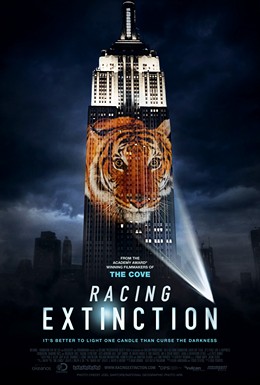RACING EXTINCTION - The Official Film - Over Half of all species on earth will be gone in 100 years!
 In Racing Extinction, a team of artists and activists exposes the hidden world of extinction with never-before-seen images that will change the way we see the planet. Two worlds drive extinction across the globe, potentially resulting in the loss of half of all species. The international wildlife trade creates bogus markets at the expense of creatures that have survived on this planet for millions of years. And the other surrounds us, hiding in plain sight — a world that the oil and gas companies don’t want the rest of us to see. Using covert tactics and state-of-the-art technology, the Racing Extinction team exposes these two worlds in an inspiring affirmation to preserve life as we know it. From the Academy Award Winning Filmmakers of “The Cove”.
In Racing Extinction, a team of artists and activists exposes the hidden world of extinction with never-before-seen images that will change the way we see the planet. Two worlds drive extinction across the globe, potentially resulting in the loss of half of all species. The international wildlife trade creates bogus markets at the expense of creatures that have survived on this planet for millions of years. And the other surrounds us, hiding in plain sight — a world that the oil and gas companies don’t want the rest of us to see. Using covert tactics and state-of-the-art technology, the Racing Extinction team exposes these two worlds in an inspiring affirmation to preserve life as we know it. From the Academy Award Winning Filmmakers of “The Cove”.
A giant ape made its way up the Empire State Building in New York City in August earlier this year. Moments later, the ape was gone, replaced by a humpback whale barreling through the surf.
In a bar a few blocks down from the iconic building in Manhattan, filmmaker Louis Psihoyos smiled. This was just one of his many initiatives meant to call attention to what our planet could lose to climate change in the coming decades.
Psihoyos’ new documentary, “Racing Extinction,” seeks to alert people to what scientists are calling the sixth mass extinction taking place on our planet. It’s also the first caused by a single species: Us.
“This is how humanity is dealing with the issue: They’re not,” said Psihoyos.
Produced for the Discovery Channel (and set to air 9pm ET on Dec. 2), “Racing Extinction” moves from a brief summary of past extinctions to an intimate look at the many ways humans are fishing, hunting, and poaching species around the world into oblivion.
While the camera captures disturbing scenes of sharks having their fins hacked off or manta rays with their gills torn out, the film also includes a healthy dose of optimism. Viewers are asked to join activists — who in some cases are risking their lives — to stop the devastating practices.
The Oscar-winning Psihoyos’ 2009 film ‘The Cove’ investigated the effects of dolphin fishing in Japan.
Alongside the ecological destruction, Psihoyos’ new film captures many stories of success. There’s an Indonesian village that used to fish manta rays, but is now the world’s largest tourist destination for manta ray watching. There’s a restaurant in Santa Monica, California, that used to illegally serve meat from an endangered species of whale before it was shut down by an undercover sting operation. And there are people like photographer Joel Sartore who are finding ways to make people more aware of species at the brink of extinction.
Psihoyos highlights the efforts of regular people, insisting that change can be achieved by getting peoples’ attention and asking them to implement small changes in their daily lives. Microsoft co-founder Paul Allen’s Vulcan Productions is leading a global campaign around the film, called #startwith1thing, that encourages viewers to make those changes. The hope is that one new environmentally friendly habit will “lead to another and another and another,” according to the campaign website.
One recurring theme in the documentary is the power of images to change reality.
“We’re all hypocrites,” Psihoyos said. His travels around the world consume large amounts of energy, and the manufacturing and transport of his filmmaking gear have their own carbon footprints. However, says Psihoyos, “You make a film — it’s a really powerful tool.”
While much of the film’s focus is on East Asia, Psihoyos says “America’s way behind.”
“Everybody points to China as the problem. They’re also the biggest solution … they produce more solar than we do. They produce more wind. They’re actually doing more right now to prevent climate change than we are — at scale.”
The documentary is set for release on Dec. 2, timed to air during the World Climate Summit in Paris, which began this week. Psihoyos hopes the film will energize people all over the world and encourage them to hold their lawmakers accountable.
“The environmental movement is actually won at Paris,” Psihoyos said, “just the idea that we’re at the table, that we’re all talking about this …. It’s huge.”
You can return to the main Books & Films page, or press the Back button on your browser.

